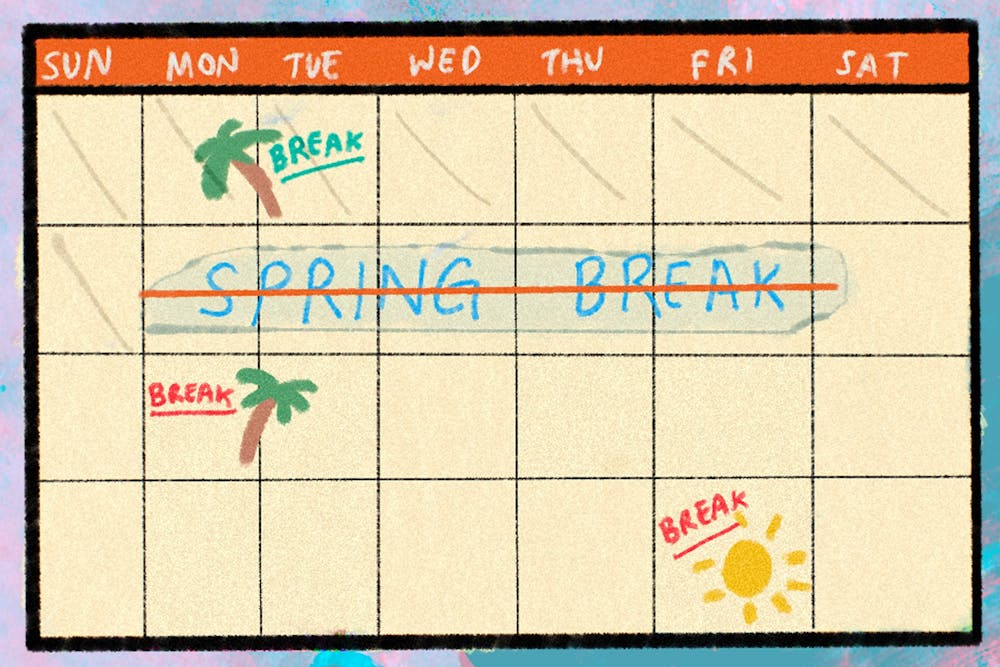
Following the cancellation of fall break and shortening of spring break, the Undergraduate Assembly passed a resolution urging administrators to give students multiple single-day breaks throughout the spring semester.
The UA unanimously passed the Resolution on the Reclaiming of Breaks for the Fall and Spring on Oct. 25, calling on Penn to institute two to five single day breaks on Fridays or Mondays throughout the remainder of the fall semester and the upcoming spring semester. The proposal is intended to prevent student travel while providing students with a greatly needed break, said College sophomore and UA Communications Director David Jin, who was the primary author of the resolution.
“The incredible amount of energy and focus devoted towards academic excellence is incompatible with merely a few days of break,” the resolution reads.
Jin emailed the resolution to Penn President Amy Gutmann, Vice Provost for University Life Mamta Accapadi, and the undergraduate deans on Oct. 28. The UA has yet to receive a response.
University administrators wrote in an email to undergraduate students on Oct. 1 that the reduction of spring break from one week to two days was made to discourage travel during the pandemic. Yet, many students expressed frustration with the decision, pointing to Zoom fatigue and concerns of mental health without the appropriate breaks from class. A recent survey by Penn Leads the Vote found that 78% of respondents' mental health was negatively or very negatively affected by the remote fall semester.
Harvard University recently announced a similar approach to the UA's resolution and will replace its traditional week-long spring break with five intermittent "wellness days" during which classes will not meet. Harvard’s Faculty of Arts and Sciences similarly reasoned that the schedule would help minimize travel while also providing downtime.
Jin said the UA hopes to communicate with administrators that the challenges of an online semester should, in fact, mean more breaks for students. The resolution noted that students typically receive 11 weekdays of break across both semesters, but this year will only receive five weekdays of break after the cancellation of fall break and the three-day reduction of spring break.
College senior and UA President Mercedes Owens said that the resolution is at the center of a general Penn Student Government push for University policies that promote student wellness during an unprecedentedly difficult semester. PSG previously endorsed the Penn Scholar Strike, during which students boycotted classes on Election Day and the day after to demand that Penn prioritize student wellness.
Rather than sending messages that provide information about CAPS or other programming, the University should implement concrete policies that would improve wellness, including an extended pass/fail deadline and more breaks, Owens added.
“The issue is not a lack of wellness-centered programming, but it's a lack of focus on reducing the mental strain in areas that students are currently struggling in,” she said.
Nearly 4,000 students signed a petition calling on Penn to extend the deadline to opt in to pass/fail grading from Oct. 30 to the end of the semester. The petition cited challenges of at-home learning, lack of grades so far in students' classes, and the stressful presidential election as reasons to extend the deadline.
In response to an email sent by the Student Committee on Undergraduate Education, one of Penn Student Government's six branches, urging Penn to extend the deadline, Provost Wendell Pritchett wrote back stating that the pass/fail deadline extension granted in spring 2020 was an "emergency measure" given the abrupt shift to online classes in March, College senior and SCUE External Chair Carson Eckhard said.
Owens said that administrators, particularly Accapadi, have been open to discussing changes to policies, although no steps toward instituting more breaks or extending the pass/fail deadline have been made yet.
“We're hoping to do a little bit more than previous years than just support the events that the University puts on, but instead help them to think critically about what are these events doing,” Owens said.
Eckhard similarly said that although there has not been movement by administration to extend the pass/fail deadline or add back break time, the College’s Council on Undergraduate Education, a non-policy making group of College faculty, is open to suggesting non-traditional breaks at the school or department level. This would allow Penn to add what are essentially break days without risking accreditation issues with Pennsylvania state regulations, which the University cited as the main reason they could not cancel classes for Election Day.
Eckhard said this could include wellness days or weeks where departments and professors agree to assign less or no work.
“It's very important that not only [administration] but faculty on an individual basis try really hard to promote wellness as we head into finals season and into another semester of courses [that are] mostly online,” Eckhard said.
The Daily Pennsylvanian is an independent, student-run newspaper. Please consider making a donation to support the coverage that shapes the University. Your generosity ensures a future of strong journalism at Penn.
Donate







